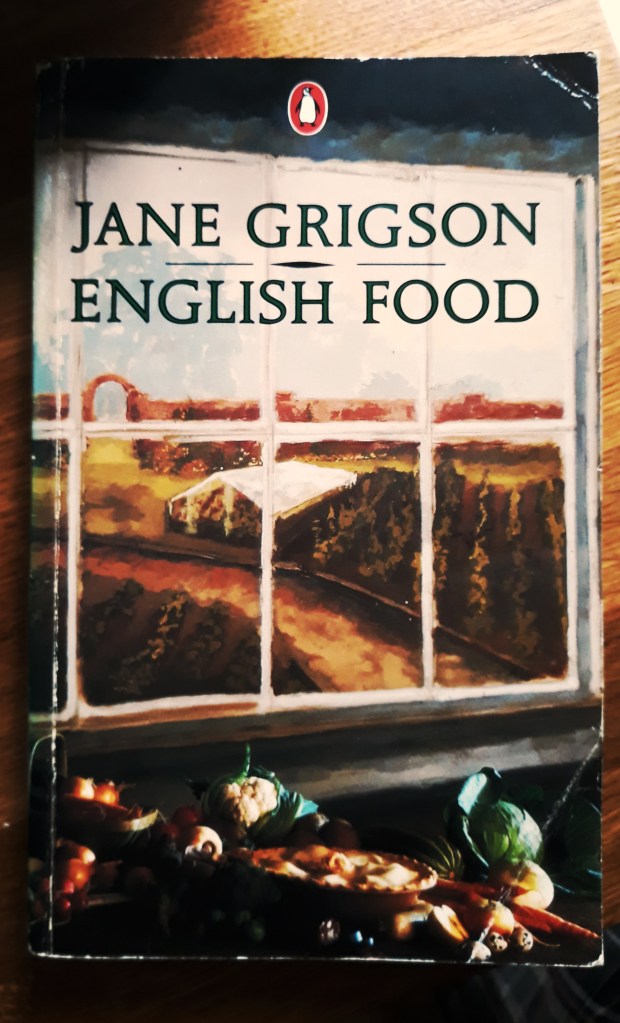A final post about the blog before I attempt to cook the remainder of the recipes in English Food…

I started writing the blog for two reasons:
- to practise writing – I had just started a PhD so I knew I’d have a lot of writing to do so I needed some practise;
- to have fun and give a bit of focus to my hobby of cooking with a “little” project looking at a country’s cuisine I didn’t know that much about – my own!
And so the project of Neil Cooks Grigson began.
…and I’m glad that I did it because being the stubborn man I am, I’m still going, though the posts are rather less frequent than they used to be, though I still post more often on my other blog British Food: A History. I’ll tell you what though, thank goodness I am stubborn because cooking and writing about British food is what I do for a living, and even had a restaurant for a couple of years. One of the best things about the blog is that I get to appear on television and radio now and again. I wonder if Jane would have approved?
If I was going to cook all 450 recipes (I didn’t realise there was that many when I started the project), I had to be authentic and stick to the ingredients used and methods laid out by Jane, but I didn’t want to over- or under-cook anything or knowingly waste food. In some cases, I was totally in her hands – I’d never cooked or eaten things like freshwater eel, calves’ brains or roast woodcock.
I came up with five simple rules:
- I must cook each of the 450 recipes (by my count) contained within English Food (see my previous post on the layout of the book). This has forced me to eat things I never would have tried – recipes for #409 Calves’ Brains in Black Butter, Sweetbread Kebabs (#317 ‘Skuets’) and #418 Roast Snipe might get a cursory glance as you flick through a classic cookbook, but one never thinks of actually making them! I had to get over my squeamishness and give them a go. Now, these ingredients are now some of my favourites to both cook and eat, in fact it seems that there is no ingredient I dislike. I have Jane to thank for this gung-ho approach to food I have acquired.
- I must cook/prepare the recipe as described within reason – if something is obviously ready well within the cooking time, or so underdone that it’s a health hazard, I’m allowed to veer from Grigson’s methods. I didn’t want to waste food, and there’s also the fact that some ingredients, items of equipment and tastes have changed since the book was first published. Cooking times have intrinsically changed; there were no fan-assisted oven in the 1970s, so baking times and temperatures both needed to be changed.
- Every ingredient listed must be used. The only exception to this being ‘optional’ ingredients. This is an issue for recipes for things like roast ptarmigan and baked roach – there’s no way round it, I have to find the ingredients, even if I have to travel to another country where it would be more sustainably responsible; ptarmigan are fairly common in Canada and Iceland for example. One example of this is #432 White Devil Sauce which asked for one ingredient that was impossible to find: Harvey’s Sauce. It had gone out of production years ago, so I thought I was going to have to make my own, which after looking in my Victorian cookbooks, I found out takes 2 years to make and mature! Naturally I put it off for years, it would be a huge effort to produce the single teaspoon required in the recipe. I decided to do it, so thought I’d research it a bit more, only to find that it was still in production! Due to the company changing hands over the years, and went under a different name, and was now sold as Maggi Traditional Worcestershire Sauce and is very popular in the Caribbean.
- Every recipe will be marked out of ten. There have been some sublime recipes made for the blog, and some real shockers. Whenever I complete a chapter, I write up a little review of it with all the scores given and see how it compares to the other ones. There have been several tens: #213 Boned Roast Sirloin, #300 Trifle and #415 Cumberland Sausage all received top marks, whilst the disappointing, terribly bland or disgusting ones get ones and twos: I shudder when I think of #313 Jellied Eel Mousse, #170 English Salad Sauce and – worst of all – the unassumingly named – #183 Scotch Rarebit. Take a look at my chapter reviews for more detailed high and lowlights and details of every score, my previous post is probably the best way to access them.
- Have fun and spent time with my friends more, even if they did roll their eyes every time I suggest another Grigson dinner.
